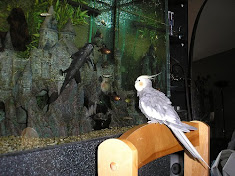When you first bring your rabbit home try to keep things as quiet as possible. They are skittish and do not like change, so will need to be gently introduced to their environment so they can become accustomed to it and you. Each new noise will be a source of fear. During the first few days after bringing them home, try not to touch them much. Sit on the floor and let them come check you out instead of approaching them. Try to keep it quiet during those first days. Do not introduce to other pets in the home right away. When you do, this needs to be done slowly as well.
 |
| A Bundle of Love by Rebecca Leatham |
Rabbits can be kept indoors or outdoors. If you keep them outside you will need a fenced in the yard. This is to keep them inside and to keep predators outside. You will need to keep a careful watch as rabbits can dig themselves out under the fence. Keep the fence maintained as predators will smell them and attempt to gain access. When you are not with them, they will need to be kept in a habitat or cage. The size should be five times the size of the rabbit. Put in hay for them to sleep upon.
If your rabbits are kept indoors you may allow them to roam but they will still need a private space just for them. You can buy enclosures specially made for rabbits. A cage is not a home as it just doesn't provide enough space. Electrical cords will need to be taped to the wall. Rabbits will chew them. Socket covers will work to keep them away from those. If you have heat registers in the floor you will need to cover them in whatever room you let your pets roam in. Their feet can become stuck in them and cause them to injure themselves.
Rabbits can be litter trained. It will take just a few weeks for them to get used to it. You will need to watch them carefully at first and each time they appear ready to relieve themselves, take them to the litter box. To keep them from chewing the things you hold as valuable they will need chew toys, lots of them. Your pets will also enjoy pushing a ball around, if it makes noise even better. They are susceptible to fleas, mites and ticks. Colds can be a problem as well. Consult your vet on the best way to handle these.
Water is important. It should be clean and cool. If they do not get enough water it can cause health issues. A sipper bottle is ideal. If it is a bowl, use one made from metal or ceramic. These do not scratch easily. The rabbit's nails would scratch a plastic bowl. Keep that bowl clean; anything in the home can end up in the bowl. They can also turn them over. Wet food or hay can turn to mold. For these reasons the sipper bottle is the better option.
Your rabbits should be fed mainly pellets. Be consistent with the food they are fed as they do not like or adapt to change in diet well. Vegetables are necessary as well. Serve one to two cups of them for every five pounds of your rabbit's weight. Clean them thoroughly to rid them of chemicals and pesticides. There should be three varieties of vegetables each day. Do not introduce more than one new vegetable a day. This will give them time to get used to it and you a chance to see how they respond to it.
Some foods to avoid are corn, potatoes, iceberg lettuce and cauliflower. Carrots should be considered a treat only. Treats will be normally be a small piece of fruit. A treat is good as a training tool. Don't give them frequently because your pet may not want to eat anything else. Consult your pet shop or your vet about what is best for the rabbit you have. These are just the basics to care for rabbits as pets.
About the Author
Written by TW Bell
If you are looking for more information on pet rabbits and cages then be sure to check out TW Bell's site. TW Bell has been involved in small animal business for 20 years. Stop by to see our multi level cages to see if they work for your home.
Article Source: ArticleSnatch Free Article Directory



0 comments:
Post a Comment